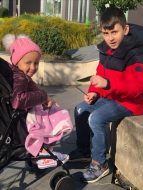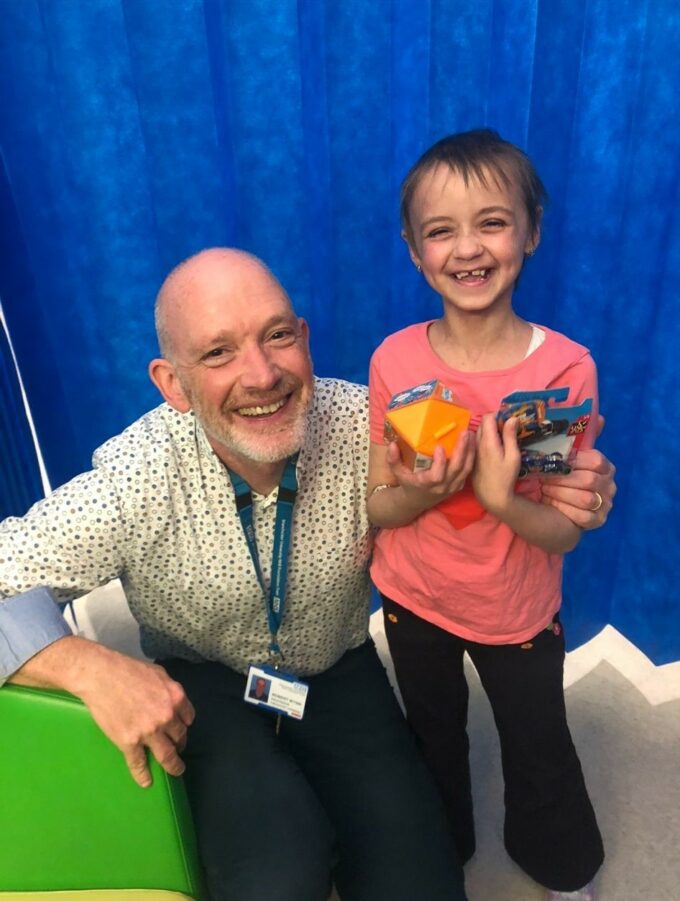Pioneering research in Manchester has shown dramatic results for treating children with high-risk leukaemia (a type of blood cancer), who previously had no hope of recovery after all other treatment options had failed.
The success of the innovative treatment is down to the help of newborn babies, as the cord blood cells taken from the placenta (afterbirth), along with a series of white blood cell transfusions, provides the most effective treatment ever trialled.
Eight-year-old Sarah was just four years old when she was first diagnosed with acute myeloid leukaemia (AML), a rare type of childhood leukaemia which is diagnosed in approximately 100 children and young adults in the UK each year.

After all other treatments failed, including chemotherapy and a bone marrow transplant, Sarah from Cornwall travelled to Royal Manchester Children’s Hospital (RMCH), part of Manchester NHS Foundation Trust (MFT), to receive the innovative treatment through the GRANS clinical trial. Now over one year in remission, the team at RMCH and her family are hopeful that this novel treatment will have cured the leukaemia.
Sarah was one of ten children in the two-year study, to receive a cord blood stem cell transplant alongside a series of white blood cell transfusions (known as granulocytes) with the aim of boosting the cancer fighting abilities of the new cord blood.
Sarah’s mum, Simona Marica, 44, a staff nurse in Cornwall, said: “When I heard the doctor first diagnose Sarah with leukaemia I started crying at the word, but even worse, we were told this was a rare, harder to treat leukaemia. She had to start chemotherapy immediately as her blood results were so bad, she could have died at any time.

“After finishing six months of chemotherapy in Bristol, she went into remission, and we were going back to a kind of normal life. That was in 2019, but in February 2020 the leukaemia returned. She had more chemotherapy and fortunately our ten-year-old son David, was a bone marrow match and donated this to Sarah, who had stem cell transplant and went into remission for 18 months”.
It was when Sarah was on chemotherapy for the third time that doctors in Bristol discussed the potential for Sarah to take part in the GRANS study at RMCH.
Simona continued: “I knew that a second transplant would be the last. As a nurse, I knew that nothing more could be done if the leukaemia came back again because her body would not be able to tolerate any more chemotherapy, or further treatments. I knew this trial was her last chance of life.”
The initial results from the study have been published in the British Journal of Haematology and the trial has been expanded to recruit more patients from across the UK following the promising results so far. Researchers are also looking into the science behind this treatment, to better understand how and why this treatment works.
Professor Rob Wynn, Consultant Paediatric Haematologist and Director of Paediatric Bone Marrow Transplant Programme at RMCH, part of MFT said: “We know from our previous research, reported in the Blood Advances journal, that cord blood cells offer the most effective treatment for children with hard-to-treat blood cancer.
“The GRANS clinical trial builds on this research and provides a treatment option for the sickest of children with AML, where no treatment options have been available.
“Sarah is one of five children from our trial who are alive and in remission as a result of this effective, experimental treatment. Without this clinical trial, it is unlikely that any of the children would still be alive.
“As a world leading transplant centre, we have the capability to carry out this specialist and transformative research for children across England and to share these remarkable results.”
Now that Sarah has been in remission for over one year, the family is finally putting the pain of the last few years behind them to concentrate on the future. This summer they are looking forward to enjoying a holiday in France with friends and experiencing normal family life.
Simona said: “I’m so glad Sarah has been part of the trial, Professor Wynn and the whole team made us feel like family, they looked after us so well and they are truly doing amazing things.
“Sarah has been through so much over the last few years, but she has been so brave. She has been my rock and she is such a cheerful, determined girl who loves school and playing with her friends.
“As a result of this research, Sarah is now fully enjoying life. She is my inspiration, and this treatment has given us all our lives back.”







